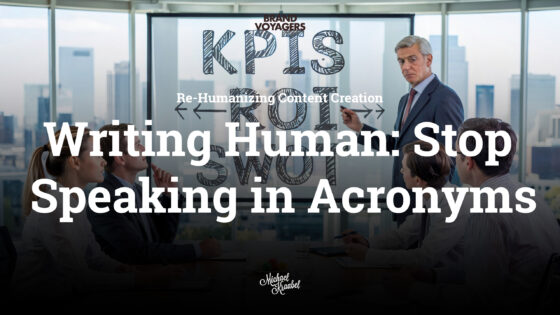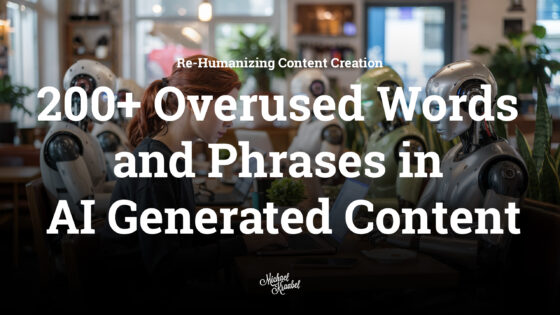Words are disappearing, and most of us haven’t even noticed. A recent study from technologist Richard Soares found that more than 11,000 common English nouns have dropped in usage by over 80 percent. Not over centuries. Not even over decades. In just the past few years.
These aren’t obscure terms or outdated jargon. These are everyday words like “resolve,” “threshold,” and “repetition.” Words we use to describe boundaries, decision-making, memory, and identity. The core concepts we rely on to make sense of the world. And somehow, they are fading. Quietly. Systematically. The culprit, it appears, is not an Orwellian Ministry of Truth censoring our dictionaries, but something more mundane and ubiquitous: algorithmically-driven content ecosystems. Soares’s model uncovered a subtle, structural force at work. As he dug into why so many words were quietly falling out of use, he found that modern content algorithms, the kind running our social media feeds and news recommendations, optimize relentlessly for user “engagement,” even if it means filtering out certain words.
As someone who has worked in content creation and marketing technoogy most of my career, I’m not easily alarmed by change. Language evolves. Culture shifts. Platforms come and go. But this pattern caught my attention, because it isn’t just evolution. It’s something else.
Soares believes the culprit isn’t censorship or cultural apathy. It’s engagement-optimized algorithms. The systems that curate what we see on social media, in search engines, and increasingly, in generative AI results. He describes a process where platforms suppress “emotionally heavy” or cognitively complex words because they tend to interrupt engagement. If a word slows someone down, even for a second, it may hurt performance. So content containing those words is shown less often. Eventually, creators stop using them to stay visible. And the words disappear.
This isn’t a nefarious plot to kill the word “integrity” or “resolve,” it’s an unintended side effect of machines tweaking what we see to keep us scrolling. The outcome, however, borders on Orwellian: a quiet “linguistic erosion” of our vocabulary without any central authority ever issuing a ban.
The Influence on Algorithms on Content
Zeynep Tufekci, a sociologist and media scholar, has written extensively about this invisible algorithmic influence. She warns that platforms are now the quiet gatekeepers of culture. They control what gets amplified and what gets buried, not by intention, but by design. And when everything is optimized for likes, clicks, and shares, the quieter, more thoughtful language doesn’t stand a chance.
Algorithmic control of content can mean the difference between widespread visibility and burial of content, Tufekci notes, and creators inevitably adapt their messages to be more algorithm-friendly. We’ve seen this in online media: writers avoid nuanced or “big” words for fear the algorithm will downrank their post; video creators keep titles snappy and simple; everyone chases the engagement metrics that determine reach. Over time, this feedback loop can subtly redefine what language thrives online. If an algorithm finds that posts with the word “repetition” don’t get enough clicks, it might serve them to fewer people, prompting writers to drop that word to improve their reach, and reinforcing the cycle. No human editor ever says “Don’t use repetition,” but functionally, the word grows scarce on our screens.
It brings to mind George Orwell’s fictional concept of Newspeak, a language designed to limit the range of thought by stripping away nuance. In 1984, the goal was political control. Today, the outcome is similar, but the mechanism is different. Nobody is telling us we can’t use certain words. But if the system makes it harder to use them, and rewards us for not using them, we drift away from them. The end result is the same. Fewer words. Fewer ideas.
This is a cultural concern. Steven Pinker, in his work on language and cognition, has argued that while thought doesn’t depend entirely on words, language shapes how we reason, what we notice, and what we remember. If we lose the words, we risk losing the concepts they carry.
Deborah Tannen, a sociolinguist, has shown how the words we use signal social dynamics, identity, and emotion. When we reduce our vocabulary, we lose not just precision, but connection. Social media is already tilting us toward simplified, extreme, and viral expressions. If subtle words vanish from the public vocabulary, our ability to communicate nuance and empathy goes with them.
By starting this conversation, I’m hoping we can make some effort towards protecting the complexity of thought, preserving cultural memory, and maintaining the tools we need to reason through a messy world. Without words like “integrity,” “fortitude,” or “virtue,” how do we even begin to talk about ethics, let alone uphold them?
So why am I writing this? Because I think we need to start the conversation. I don’t have all the answers. I’m not calling for a regulation or a revolt. But I am calling for awareness. If you create content, choose your words intentionally. Don’t default to what the algorithm prefers. If you run platforms, look more closely at what’s being filtered out and why. And if you care about the cultural health of society, pay attention to what’s missing from our shared language.
We can’t afford to let algorithms decide what we remember, what we value, or how we speak. Language is a public trust. If we want to keep it rich, meaningful, and alive, we have to use it. All of it.
This is the beginning of the conversation. Not the end.
Mindful Language as a Form of Resistance
All of this leads to a stark thesis: our digital content ecosystem, optimized for maximal engagement, is inadvertently chipping away at the foundations of language, with quiet but important implications. This is both a warning and a call to action. We should not resign ourselves to a world where algorithms, in pursuit of our attention, steadily erase bits of our cultural and cognitive inheritance. The beauty of human language is its endless richness and adaptability. We coin new terms for new realities, yes, but we also preserve old words that still carry meaning. There is power in that continuity. Terms like “integrity,” “justice,” “mercy,” or “resolve” encapsulate centuries of thought and struggle; they are cornerstones of literature, law, and moral philosophy. Letting them fade for lack of “engagement” is a loss far greater than a few points off the engagement rate.
Reversing this trend starts with intentional language use. As individuals and as content creators, we can resist the pressure to simplify and sanitize our vocabulary for the sake of an algorithm. Use the precise word, even if it’s a bit “heavy.” Cherish those less-common nouns and descriptors that carry shades of meaning. In our classrooms and conversations, we should celebrate vocabulary, not as pedantry but as empowerment: each word giving us a new lens on the world. We can also push platforms for transparency and plurality: if algorithmic curation is deciding our cultural diet, we have the right to demand it not strip out the nutritive fiber of language. As Tufekci and other critics argue, the solution may include greater transparency and human oversight in algorithmic design, ensuring that what maximizes short-term clicks doesn’t impoverish long-term discourse.
Finally, we must recognize that language is a public trust. Part of our shared commons. When words disappear, something is taken from all of us. It’s akin to losing biodiversity in an ecosystem; even if you didn’t directly use those 11,000 nouns, their absence makes the whole linguistic environment more fragile and monotonous. The quiet crisis of disappearing vocabulary deserves our attention precisely because it is quiet. There will be no alarm bell when the last person uses the word “fortitude” in a tweet. If we’re not paying attention, we simply wake up to a slightly poorer language each day. And with a poorer language, we risk poorer thoughts, poorer debates, and a poorer grasp of our own humanity.
In Orwell’s 1984, the character Syme, a linguist working on Newspeak, famously says, “It’s a beautiful thing, the destruction of words.” Today, we should assert the opposite: it’s a tragic thing, the destruction of words, especially by the unintended consequences of our own creations. We built the algorithms; we can also guide them to serve us better. Let’s not allow engagement metrics to be the grim reaper of our lexicon. By remaining vigilant and intentional in our language, we ensure that our cultural memory, cognitive tools, and capacity for nuanced discourse remain intact. In the face of silent erosion, every word we choose to keep in play is an act of resistance and hope.





